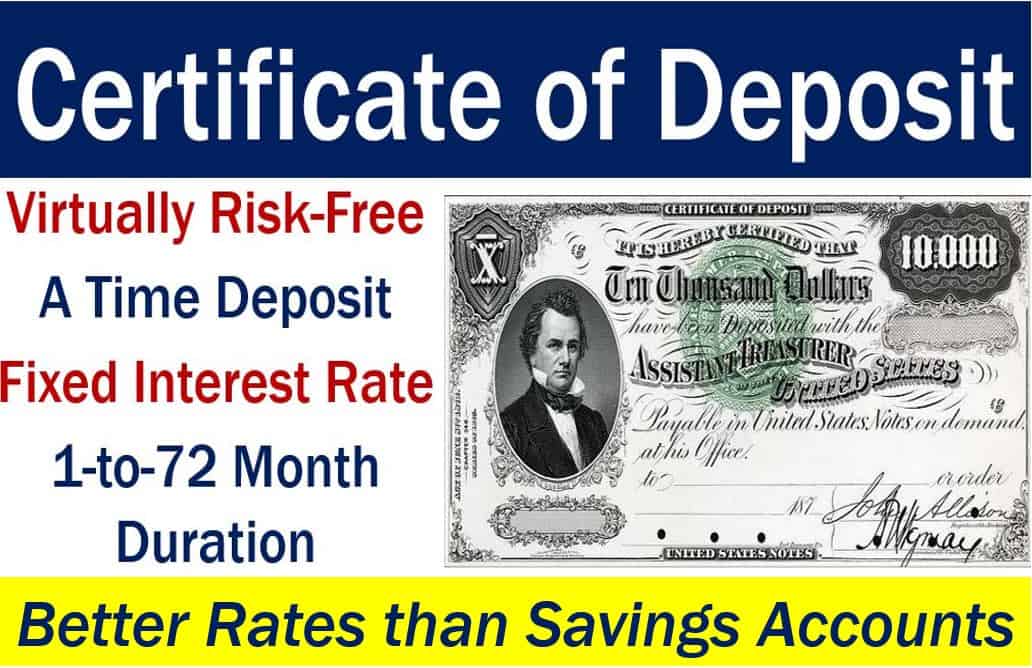A certificate of deposit or CD is an interest-bearing, short-term or medium-term debt instrument. It is a time deposit that credit unions, banks, and thrift institutions sell. A certificate of deposit offers higher rates than most comparable investments.
Owners of these low-risk time deposits hold on to them from between one month to six years.
A certificate of deposit is similar to a savings or deposit account. The terms ‘savings account’ and ‘deposit account’ have the same meaning.
They are virtually free of risk because of insurance coverage. In the United States, the FDIC (Federal Deposit Insurance Corporation) insures CDs for banks. The NCUA (National Credit Union Administration (NCUA) insures them for credit unions.

According to the Wall Street Journal, the FDIC insures your CD for up to $250,000. In other words, if your bank collapses, at least $250,000 of your investment is safe.
CDs have specific terms; typically one, three, and six months. However, some even last up to six years. Most of them have a fixed interest rate. The issuer expects the CD buyer to hold onto it until maturity.
CD’s are savings certificates which pay you interest. They bear a maturity date and a set interest rate. The financial institution may sell them in different denominations.
A certificate of deposit is an example of a promissory note that a bank issues. The time-deposit restricts holders from cashing in on demand. It is still possible to withdraw the fund. However, this action will incur a penalty.
Withdrawing funds before maturity means the loss of up to 12 months’ interest. In fact, most holders do not withdraw their money before maturity because of the penalty.
In America, people call certificates of deposit of less than $100,000 small CDs. There are also large CDs or Jumbo CDs. These are worth more than $100,000. Most CDs are negotiable.
Not all CDs offer fixed interest rates. In mid-2004, interest rates were forecast to rise. Several banks and credit unions started to offer CDs with a ‘bump up’ feature. In other words, they allowed for a single readjustment of the interest. The bearer could choose when to readjust the interest rate.
Financial institutions may index CDs to the bond market. Some also index them to the stock market or other indices.
Types of Certificate of Deposit
Traditional CD
Traditional CD bearers receive a fixed rate of interest over a set period. At maturity, they can withdraw their money. Alternatively, they can roll it into another. Holders face a penalty if they withdraw before maturity.
Zero-Coupon CD
Rather than pay out annual interest, the zero-coupon CD re-invests the payments. Consequently, the holder ends has more money at maturity. Zero-coupon CDs have higher interest rates than other CDs.
Bump-Up CD
Holders can alter the interest rate by swapping their CD. In other words, they can trade in their CD for one with a similar maturity date. However, the new CD provides a better return.
Most financial institutions that offer bump-up CDs allow the holder to raise the interest rate. The holder can also keep that higher rate until maturity.
Liquid CD
With liquid CDs; you can withdraw part of the deposit penalty-free. Interest rates are usually lower than other CDs. However, you still get a higher rate of interest than in a bank savings account.
Brokered CD
We call a certificate of deposit that brokerages offer ‘brokered CDs.’ Brokerages have access to thousands of banks’ CD offerings. They also have access to online offerings. CDs from online and smaller institutions have higher interest rates.
Callable CD
The bank can recall a callable CD after a set period. However, if the bank recalls the CD, it must return the deposit plus interest accrued to the holder.
Financial institutions might recall their CDs if interest rates fall significantly below the initial rate. To attract investors, banks usually offer a higher interest rate. Brokerages usually offer callable CDs.
The US Securities and Exchange Commission (SEC) says the following regarding certificates of deposit:
“A CD is a special type of deposit account with a bank or thrift institution that typically offers a higher rate of interest than a regular savings account. Unlike other investments, most CDs feature federal deposit insurance up to $250,000.”
Do not let the CD’s high yield dazzle you, the SEC advises. The right CD might have a lower yield than the one you are considering. You may also prefer one with lower risk.
Before buying a CD, consumers need to make sure they fully understand all of its terms. Make sure you read the CD’s disclosure statement carefully.
The SEC advises people to ask questions. Additionally, you should check with an impartial source.
Before you buy a certificate of deposit:
- Check the terms carefully.
- Read its disclosure statement thoroughly.
- Get expert advice from an independent source. In other words, a source that is impartial.
- Think about your financial goals and risk tolerance.
- Make sure you know when the CD matures. It may be a long time before you have access to your money.
- Investigate any call features.
– Make sure you understand the difference between a CD’s maturity date and call period. Do not assume that a ‘federally insured 1-year non-callable’ CD matures in one year because it doesn’t. It means the financial institution cannot redeem the CD during the first year. It is important to know that it has nothing to do with its maturity date.
Video – Certificate of Deposit: Two Warnings
This Professor Savings video warns people considering purchasing CDs. You should bear in mind that both tax and inflation will reduce the return that you expect considerably.
